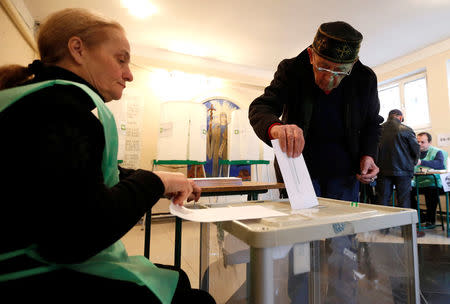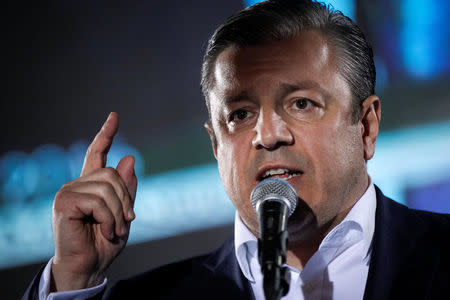Ruling party in Georgia wins constitutional majority after vote run-off
By Margarita Antidze TBILISI (Reuters) - Georgia's ruling party decisively won a second round of voting on Sunday, giving it more than three quarters of seats in parliament, enough to change the constitution if it wants, data from the Central Election Commission showed on Monday. The result cements Georgian Dream's already firm grip on power in the ex-Soviet nation and is a crushing defeat for the opposition United National Movement (UNM) and its founder, former president Mikheil Saakashvili, a regional governor in Ukraine who has spoken of a possible return to his homeland. Georgian Dream, which came to power in 2012, is pro-Western but also favors closer ties with Russia, while the UNM is strongly pro-Western. A U.S. ally traditionally buffeted between Russia and the West, Georgia is criss-crossed by strategically important oil and gas pipelines and hopes to join the European Union and NATO one day. U.S. President Barack Obama's administration congratulated Georgia on the "successful completion" of the elections. "We now encourage political leaders from all parties to work together in pursuit of goals important to all Georgians, including democratic consolidation, security, and economic prosperity," said U.S. National Security Council spokesman Ned Price in a statement. Funded by tycoon Bidzina Ivanishvili, the country's richest man, Georgian Dream won 67 seats in the 150-seat parliament in an Oct. 8 round of voting. Runoff contests were then held on Sunday for 50 seats where no single candidate won a majority. Central Election Commission data showed that Georgian Dream won 48 of those 50 single-mandate constituencies, meaning it will have 115 of 150 seats in parliament. That means it will easily be able to pass laws and amend the constitution. The opposition UNM will only have 26 seats, while the pro-Russian Alliance of Patriots will have 6 seats. There is speculation Georgian Dream may use its dominance to further curb the powers of the presidency in favor of the prime minister's office, or to even abolish direct presidential elections and have parliament choose the president instead. The opposition complained of violations during voting, but the Organization for Security and Co-operation in Europe, while recognizing some problems, said the first round of voting was generally competitive. (Editing by Andrew Osborn and Diane Craft)



